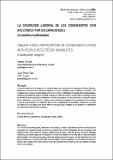Por favor, use este identificador para citar o enlazar a este item:
http://hdl.handle.net/10261/23965COMPARTIR / EXPORTAR:
 SHARE
BASE SHARE
BASE
|
|
| Visualizar otros formatos: MARC | Dublin Core | RDF | ORE | MODS | METS | DIDL | DATACITE | |

| Título: | La ocupación laboral de los convivientes con afectados por discapacidades. Un análisis multivariable |
Autor: | Spijker, Jeroen; Pérez Díaz, Julio CSIC ORCID | Palabras clave: | Dependencia Discapacidad Salud Trabajo Género Ocupación Cuidado informal Disability Informal care Dependency Employment Health España Spain |
Fecha de publicación: | 5-may-2010 | Editor: | Consejo Superior de Investigaciones Científicas (España) | Citación: | Revista Internacional de Sociología 68(2): 311–332 (2010) | Resumen: | [ES] La relación entre el rol de cuidador y la actividad laboral ha cambiado mucho durante las últimas décadas, influida por la evolución del contexto demográfico, sanitario y sociológico, pero también por una política sociosanitaria que persigue la máxima implicación de los familiares. Utilizando la Encuesta sobre Discapacidades, Deficiencias y Estado de Salud, y mediante el análisis de regresión logística multivariable, investigamos cómo se relacionan en los hogares la convivencia o cuidado de personas con discapacidad y la ocupación laboral de los convivientes. Los resultados confirman que el determinante principal es la asunción del rol de cuidador y no el sexo, pero también se comprueba que los roles complementarios, masculinos y femeninos, se hacen más intensos en los hogares que deben afrontar la discapacidad de alguno de sus miembros, en detrimento de la igualación entre hombres y mujeres. [EN] As a result of deep demographic, health and social changes, as well as adjustments to public health policy that now seeks the maximum involvement of family members, the relationship between the role of caregiver and employment has observed many changes during the past decades. Using the Spanish Survey on Disability, Deficiency and Health Status we investigate the relationship between co-residing with or caring for people with disabilities and employment using multivariate logistic regression analysis. Results indicate that it is not gender but the role as caregiver that is the main determinant of being employed. It is also found that both roles become more burdensome at the expense of gender equality in homes that have to cope with the disability of one of its members. |
Descripción: | Este artículo está sujeto a una licencia CC BY 4.0 | Versión del editor: | https://doi.org/10.3989/ris.2008.03.14 | URI: | http://hdl.handle.net/10261/23965 | ISSN: | 0034-9712 10.3989/ris.2008.03.14 |
| Aparece en las colecciones: | (CCHS-IEGD) Artículos |
Ficheros en este ítem:
| Fichero | Descripción | Tamaño | Formato | |
|---|---|---|---|---|
| RIS2010.pdf | 587,48 kB | Adobe PDF |  Visualizar/Abrir |
CORE Recommender
Page view(s)
504
checked on 23-abr-2024
Download(s)
306
checked on 23-abr-2024
Google ScholarTM
Check
Este item está licenciado bajo una Licencia Creative Commons

